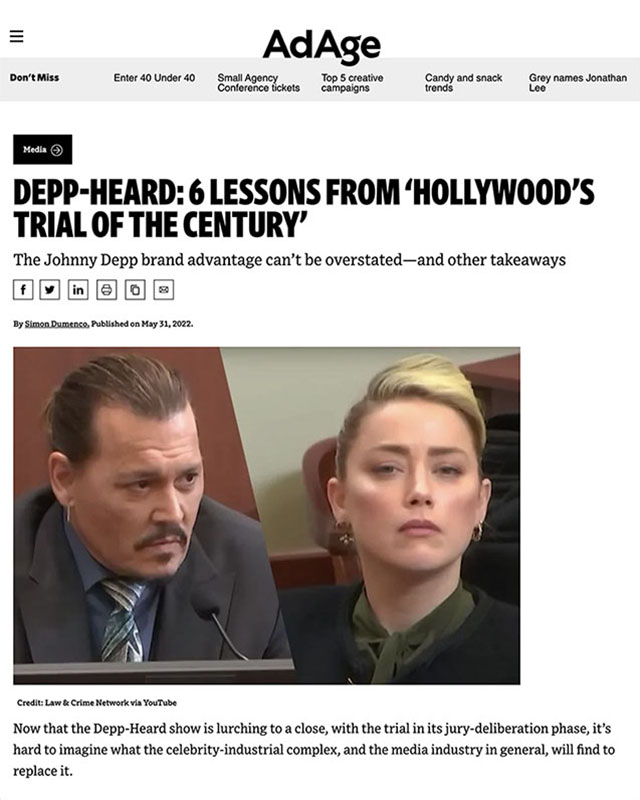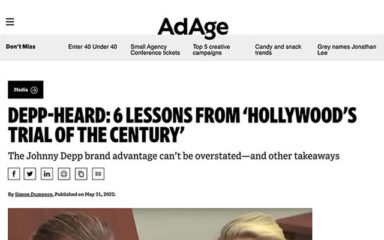[Content warning here for domestic abuse and sexual violence. And possibly some language of a spicier variety than I tend to use in a work-adjacent blog post.]

I wouldn’t have thought “Don’t try to turn a real-life domestic violence case into a cheap content grab” would be an admonition I’d have to make to an advertising industry publication, but the past few years have been packed with surprises at every turn, and here we are.
And so here we are: Don’t try to turn a real-life domestic violence case into a cheap fucking content grab, Ad Age.
The actual hell. This isn’t about the “Johnny Depp brand advantage,” which are words someone typed and then read and then said Yeah, that’s fine and then clicked Publish.
This isn’t about the “Depp-Heard show,” which is not in fact a show but actually a defamation case surrounding allegations of domestic violence, where words like “I’ve never been so scared in my life” have been spoken on the stand.
This isn’t about “Depp-Heard” becoming “its own content economy,” which has taken place largely in the form of mocking memes constructed on a woman’s testimony about her alleged abuse at the hands of her husband, and which, yeah, was lampooned on SNL, which was also pretty atrocious.
This isn’t a “dark ride” with “often jaw-dropping twists and turns.”
It’s not a “referendum on celebrity popularity.”
It’s a defamation case surrounding allegations of domestic violence.
It’s a case that started with an article titled, “I spoke up against sexual violence — and faced our culture’s wrath,” and has included testimony from two people detailing abuses allegedly committed against them, some of which has already been bastardized for the TikTok lulz but hey, what the hell, there’s more juice to squeeze out of this lemon, right, Ad Age?
What the actual hell?
What it is about
While we’re talking about things I wouldn’t have seen myself having to do: I wouldn’t have seen myself having to explain why things like domestic violence aren’t fodder for har-de-har Spicy Celeb clickbait, but again, we live in a time of surprises, so here I go.
It’s about an observation of how our culture treats survivors of domestic violence (which I think we can all agree, judging from public reaction to this very trial, is “badly”), and the callousness with which society treats serious cases that affect actual human people.
It’s about the public’s perception of male victims of domestic violence (regardless of your feelings about whether or not Depp himself is one of those).
It’s about the implications of violence from multiple parties, and how (and if) we assign fault and victimhood.
It’s about parasocial relationships, and the way celebrity worship can drive people to do some pretty heinous stuff.
And it’s about the message all of this is sending to actual survivors of domestic violence, of all genders, who have probably seen (whether they wanted to or not) testimony and evidence that matches up with their own experiences, causing them to relive some of the most terrible times in their lives, and then seeing it all reduced to a joke, to TikTok videos and SNL gags and armchair legal and mental health experts declaring people to be liars and narcissists with agendas.
And if you’re seeing the whole thing as a matter of ratings, clicks, views, follows, and comedy fodder, you need to question where your perspective got so severely distorted.
I’m sorry, what?
In case you don’t feel like perusing “Depp-Heard: 6 Lessons From ‘Hollywood’s Trial of the Century,’” here’s what you’re missing:

Citing Depp’s “brand advantage” — the fact that he has a long career including films beloved to Gen Xers and a Disney franchise where he played a quirky, funny, likable character — contrasted with Heard’s more modest career, turning the trial into a “referendum on celebrity popularity” instead of a court trial concerning domestic violence, as a justification for some people considering him a more credible witness even though it has fuck-all to do with his actual abusive behavior or lack thereof.
Bringing #MeToo into it, because it’s not enough to trivialize just one domestic violence case, we have to drag the concept of “believing women” into the mix to pit recordings of two “professional fakers” against each other, one (and only one) of whom must be “just performing.”
Pitting the #justiceforamberheard and #justiceforjohnnydepp TikTok hashtags against each other and declaring a winner, as if both aren’t being used to mock, demean, discredit and flat-out condemn a woman (almost exclusively) for her testimony about abuse allegedly visited upon her.
Reducing the entire trial, allegations, conflict, anguish, to a “killer app” and a ratings boom for a couple of cable networks and their YouTube channels as viewers flock to their content to consume the trial like it’s a soap opera.
Characterizing the whole thing as “entertaining. Yes, in the way that a train wreck is entertaining — but entertaining still the same.”
I will acknowledge that the article is correct in observing that, in today’s media culture, “celebrity dysfunction beats celebrity worship.” I’ll then ding it for the lack of self-awareness required to see that this article is not fucking helping.
What the hell is this?
I’m going to have to bring in one more thing that I’d rather not, but again, I’m doing a lot of things I’d rather not in this post: the question of bias on the part of the article’s author, Simon Dumenco. I’m not going to come straight out and accuse him of taking one side or the other, because I can’t know what’s in his head. But the dismissive comments about her career, the boos she’s received outside of the courtroom, his just-asking-questions comments about her potentially “just performing,” the unnecessary parenthetical about whether or not she might have actually been faking her injuries (all safely attributed to other people so he couldn’t be accused of bias, he’s just reporting the facts) without any mitigating perspective from another side of it — it leads one to wonder about whether Dumenco has an agenda that he’s clumsily tried to disguise as impartial educational content. (See? I didn’t say I wondered, just that one might wonder, and that completely obviates any responsibility on my part.)
And I have to ask: What the hell is this doing on an advertising industry website? What does this have to do with advertising? Why would Ad Age be an appropriate venue for a thinly veiled assessment of an ongoing court case surrounding a domestic violence dispute? Who read this and thought, “Yes, everything about this is legit and has a place on our site”?
Ad Age, the best time for a public apology would have been about ten seconds before you clicked Publish on this godawful article. Like, the appropriate content for this particular slice of internet would have been Y’all, this might not make sense, but we’re extremely sorry for almost posting the thing we just reconsidered and decided not to post. XOXO, Ad Age. But failing that, time travel not being a thing, the second-best time is now. And if you’re lucky, this extremely painful, vulnerable moment in your life won’t be mocked incessantly and repurposed for content. Because that shit’s not a joke.


